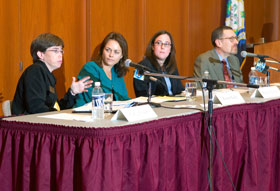  |
| HOME | THIS ISSUE | CALENDAR | GRANTS | BACK ISSUES | < BACK | NEXT > |
New technology reshaping privacy rights, say panelistsby Sherry Fisher - September 25, 2006 | ||||
| Be careful about what you send through the Internet or discuss on your cell phone: Your messages may not be as private as you think. That's what panelists told students, faculty, and staff during a discussion about the Fourth Amendment and technology Sept. 18 in Konover Auditorium. Moderated by political science professor Howard Reiter, the event was held on the 10th anniversary of Constitution Day. "While it's clearly the case that the Fourth Amendment established a commitment to protecting privacy in the interest of individuals, the new challenges we're facing with technology are forcing us to look beyond the Constitution to protect our privacy," said Kristin Kelly, an associate professor of political science. Kelly said the first time the Supreme Court addressed the question of privacy in the context of technology was in a 1928 case, Olmstead v. the United States, involving an FBI wiretap of a bootlegger and others engaged in a conspiracy to sell liquor during Prohibition. The court ruled 5-1 that the Fourth Amendment prohibition against illegal search and seizure did not apply, Kelly said. "Their logic was that since the invasion of privacy had occurred through wiretapping and involved no trespassing in the sense of a physical invasion, that a search had not taken place." Judge Louis Brandeis vigorously disagreed, she noted. He argued that the absence of physical intrusion did not alter the fact that there was a clear violation of the privacy rights of an individual. He warned that the progress of science would only increase the likelihood that such non-physical intrusions would take place. "Brandeis is one of my heroes and was clearly ahead of his time," Kelly said. It was not until 1967 that the Supreme Court finally overturned Olmstead and applied the Fourth Amendment to technologically-based intrusions on privacy. That case was Katz v. the United States, involving the use of a government wiretap. "The FBI was investigating Katz for engaging in illegal gambling, and had reason to believe he was using a particular phone booth to place his bets," Kelly said. As part of the investigation, they placed a phone tap on the outside of the booth. They recorded his conversation and later used it to convict him. The court had to decide whether the FBI violated Katz's' Fourth Amendment rights by not having a search warrant, Kelly said. "The use of wiretapping, even though it was a public phone booth, did, in fact, represent a search of Katz, and therefore the FBI should have obtained a warrant beforehand. The court made it clear that the Fourth Amendment was to protect people, and not places."
We live "in a world that's filled with computers, databases, and cell phones, and what counts as a reasonable expectation of privacy has shifted significantly in recent years," she said. "The majority of us are aware that if we talk on the cell phone or e-mail, our communications can easily be accessed by third parties, so our expectations are going to be lower." Rachel Krinsky Rudnick, an attorney who is a privacy officer at the University, said her office examines law to "make sure that we're protecting all your privacy rights. We try to make sure that third parties who wouldn't be entitled to your information aren't getting it." The Family Educational Rights and Privacy Act (FERPA) is students' major law of protection, Krinsky Rudnick said, noting that if a third party seeks out information about a student, such as his or her grades, the University may not release that information without the student's explicit permission. "You have a lot of folks looking out for you in terms of your rights," she told students in the audience. Inside the University, student information can be shared with anyone who has a legitimate educational purpose, Krinsky Rudnick said. Professors, for example, may share students' grades with the Registrar's Office. As far as the Freedom of Information Act, she said, "I look at what it is that a member of the public is asking for, and I make sure that it's not going to violate your privacy rights. Generally, e-mails among students and between students and professors are protected because they're considered student records. E-mails between professors and employees generally are not." Cathy Cocks, director of judicial affairs in the Dean of Students' Office, said that keeping blogs on the Internet or creating Facebook and MySpace profiles have consequences. "When you make the decision to put things out on the Internet, you need to understand that people are going to look at it," she said. "Nothing on the Internet is truly secure or private." People list their date of birth, their phone number, and where they live, "and they join various groups that are less than impressive," Cocks said, advising students to be careful. She noted that employers sometimes visit such web sites to find out more about potential employees. "You have this tremendous right to privacy," she said, "but you have to be an active citizen in order for it to work."
|
| ADVANCE HOME UCONN HOME |

